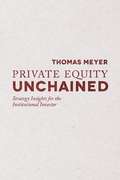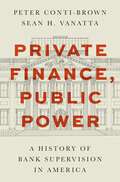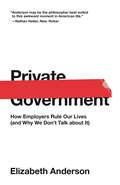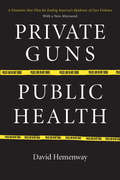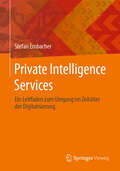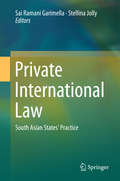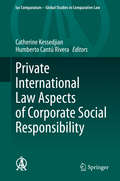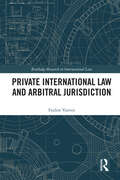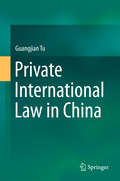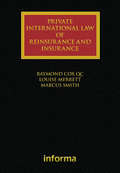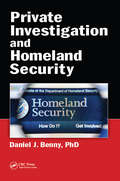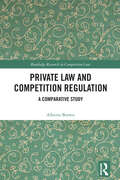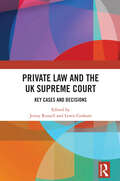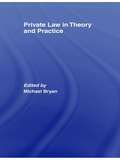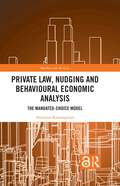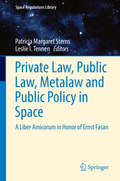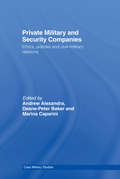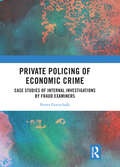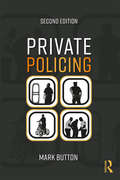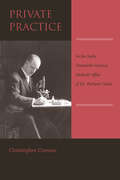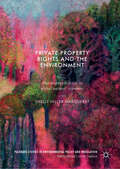- Table View
- List View
Private Equity Unchained: Strategy Insights For The Institutional Investor
by Thomas MeyerThere are significant returns to be made from private equity, infrastructure, real estate and other illiquid investments, but a competitive strategy is essential for investment success and for meeting objectives. This book takes readers through all the considerations of planning and implementing an investment strategy in illiquid investments.
Private Finance, Public Power: A History of Bank Supervision in America
by Peter Conti-Brown Sean H. VanattaThe strange and contested evolution of the management of banking riskBanks in America are private institutions with private shareholders, boards of directors, profit motives, customers, and competitors. And yet the public plays a key role in deciding what risks are taken as well as how, when, and to what end. Public-private negotiations over financial governance has evolved into an essential ecosystem of banking risk management. In Private Finance, Public Power, Peter Conti-Brown and Sean Vanatta offer a new history of finance and public policy in the United States by examining the idiosyncratic way the nation manages financial risk across the public-private divide. Covering two centuries, from the founding of the Republic to the early 1980s, Conti-Brown and Vanatta describe the often-contested, sometimes chaotic, engagement of bankers, politicians, bureaucrats, and others in the overlapping spaces of the public-private system of bank supervision.Conti-Brown and Vanatta trace the different supervisory frameworks that evolved over time, from the imposition of private liability on bank shareholders to the development of the central bank to the creation of federal deposit insurance. Negotiations took place at federal and state levels, but, over time, the federal government assumed most of the responsibility for managing financial risk. Moreover, federal supervisory officials began to undertake more varied tasks, including monitoring racial discrimination and managing financial concentration. Conti-Brown and Vanatta introduce a diverse cast of characters—bankers, politicians, bureaucrats, and others—and show how they navigated two hundred years of financial panics, scandals, and crises to build the system that structures modern America&’s banking system.
Private Government: How Employers Rule Our Lives (and Why We Don't Talk about It) (The University Center for Human Values Series #44)
by Elizabeth AndersonWhy our workplaces are authoritarian private governments—and why we can't see itOne in four American workers says their workplace is a "dictatorship." Yet that number probably would be even higher if we recognized most employers for what they are—private governments with sweeping authoritarian power over our lives, on duty and off. We normally think of government as something only the state does, yet many of us are governed far more—and far more obtrusively—by the private government of the workplace. In this provocative and compelling book, Elizabeth Anderson argues that the failure to see this stems from long-standing confusions. These confusions explain why, despite all evidence to the contrary, we still talk as if free markets make workers free—and why so many employers advocate less government even while they act as dictators in their businesses.In many workplaces, employers minutely regulate workers' speech, clothing, and manners, leaving them with little privacy and few other rights. And employers often extend their authority to workers' off-duty lives. Workers can be fired for their political speech, recreational activities, diet, and almost anything else employers care to govern. Yet we continue to talk as if early advocates of market society—from John Locke and Adam Smith to Thomas Paine and Abraham Lincoln—were right when they argued that it would free workers from oppressive authorities. That dream was shattered by the Industrial Revolution, but the myth endures.Private Government offers a better way to talk about the workplace, opening up space for discovering how workers can enjoy real freedom.Based on the prestigious Tanner Lectures delivered at Princeton University's Center for Human Values, Private Government is edited and introduced by Stephen Macedo and includes commentary by cultural critic David Bromwich, economist Tyler Cowen, historian Ann Hughes, and philosopher Niko Kolodny.
Private Guns, Public Health
by David HemenwayOn an average day in the United States, guns are used to kill almost eighty people, and to wound nearly three hundred more. If any other consumer product had this sort of disastrous effect, the public outcry would be deafening; yet when it comes to guns such facts are accepted as a natural consequence of supposedly high American rates of violence. Private Guns, Public Health explodes that myth and many more, revealing the advantages of treating gun violence as a consumer safety and public health problem. David Hemenway fair-mindedly and authoritatively demonstrates how a public-health approach-which emphasizes prevention over punishment, and which has been so successful in reducing the rates of injury and death from infectious disease, car accidents, and tobacco consumption-can be applied to gun violence. Hemenway uncovers the complex connections between guns and self-defense, gun violence and schools, gun prevalence and homicide, and more. Finally, he outlines a policy course that would significantly reduce gun-related injury and death.
Private Intelligence Services: Ein Leitfaden zum Umgang im Zeitalter der Digitalisierung
by Stefan EmbacherDie Einführung des Buches legt den Grundstein für die nachfolgenden Kapitel, indem sie die Definitionen und Grundlagen der Wirtschaftskriminalität klärt und ein solides Verständnis für die Dimensionen und die Tragweite dieser Herausforderung schafft. Sie legt dar, wie Wirtschaftskriminalität nicht nur finanzielle Verluste verursacht, sondern auch das Vertrauen in Märkte und Institutionen untergräbt, was weitreichende soziale und wirtschaftliche Konsequenzen nach sich zieht. Im ersten Kapitel wird die Zusammenarbeit zwischen privaten Intelligence-Unternehmen und staatlichen Behörden beleuchtet. Es werden Fallstudien und Beispiele präsentiert, die demonstrieren, wie eine erfolgreiche Partnerschaft aussehen kann, und welche Herausforderungen und Spannungsfelder dabei auftreten können. Das Kapitel unterstreicht die Bedeutung von Vertrauen, Transparenz und gegenseitigem Respekt für den Erfolg dieser Kooperationen. Das zweite Kapitel widmet sich den spezifischen Herausforderungen und Anforderungen, die verschiedene Branchen und Sektoren an private Intelligence-Unternehmen stellen. Es wird detailliert aufgezeigt, wie unterschiedlich die Bedürfnisse von Unternehmen, je nach Größe, Branche und geografischer Lage sein können, und wie maßgeschneiderte Lösungen aussehen können. Es wird deutlich, dass eine tiefgehende Branchenkenntnis und Spezialisierung essentiell sind, um effektive Dienstleistungen zu bieten. Das dritte Kapitel ist in mehrere Unterkapitel gegliedert und deckt ein breites Spektrum an Themen ab, darunter die besonderen Anforderungen bestimmter Zielgruppen, Methoden und Techniken zur Sicherung von Vermögenswerten und Informationen, sowie praxisnahe Fallbeispiele und Best Practices. Hier wird auch aufgezeigt, wie Unternehmen wie Foreus als Dienstleister in der Praxis agieren und welche Rolle sie im Gesamtkontext spielen. Das vierte Kapitel setzt sich mit den rechtlichen und ethischen Aspekten von Private Intelligence auseinander. Es werden aktuelle Gesetzgebungen und Rechtsprechungen diskutiert, ethische Dilemmata beleuchtet und klare Empfehlungen und Richtlinien für verantwortungsvolles Handeln präsentiert. Das fünfte Kapitel blickt in die Zukunft und versucht eine Prognose über die nächsten 10 Jahre im Bereich Private Intelligence und Wirtschaftskriminalität abzugeben. Es werden technologische Entwicklungen, Ausbildungs- und Weiterbildungsmöglichkeiten sowie potentielle Herausforderungen und Chancen diskutiert. Das abschließende sechste Kapitel fasst die zentralen Erkenntnisse zusammen, bietet konkrete Handlungsempfehlungen für verschiedene Fachleute und endet mit abschließenden Gedanken und einem Ausblick in die Zukunft.
Private International Law
by Sai Ramani Garimella Stellina JollyThis book shows how, with the increasing interaction between jurisdictions spearheaded by globalization, it is gradually becoming impossible to confine transactions to a single jurisdiction. Presented in the form of a compendium of essays by eminent academics and practitioners in the field, it provides a detailed overview of private, international law practice in South Asian nations, addressing contemporary discourse within this knowledge domain. Conflict of laws/private international law arises from the universal acknowledgment that it is difficult to govern human transactions solely by the local law. The research presented addresses the three major threads of private international law - jurisdiction, choice of law and enforcement - within each of the South Asian countries in the areas of family law and commercial law. The research in family law domain includes traditional areas such as marriage, divorce and maintenance, as well as some of the contemporary concerns in this region - inter-country child retrieval, surrogacy, and the country statement on accession to the Hague Conventions related to this domain. In commercial law the research explores the concerns raised with regard to choice of law issues in transnational contracts, and also enforcement of foreign judgment/arbitral awards in the nations of this region.
Private International Law Aspects of Corporate Social Responsibility (Ius Comparatum - Global Studies in Comparative Law #42)
by Catherine Kessedjian Humberto Cantú RiveraThis book addresses one of the core challenges in the corporate social responsibility (or business and human rights) debate: how to ensure adequate access to remedy for victims of corporate abuses that infringe upon their human rights. However, ensuring access to remedy depends on a series of normative and judicial elements that become highly complex when disputes are transnational. In such cases, courts need to consider and apply different laws that relate to company governance, to determine the competent forum, to define which bodies of law to apply, and to ensure the adequate execution of judgments. The book also discusses how alternative methods of dispute settlement can relate to this topic, and the important role that private international law plays in access to remedy for corporate-related human rights abuses.This collection comprises 20 national reports from jurisdictions in Europe, North America, Latin America and Asia, addressing the private international law aspects of corporate social responsibility. They provide an overview of the legal differences between geographical areas, and offer numerous examples of how states and their courts have resolved disputes involving private international law elements. The book draws two preliminary conclusions: that there is a need for a better understanding of the role that private international law plays in cases involving transnational elements, in order to better design transnational solutions to the issues posed by economic globalisation; and that the treaty negotiations on business and human rights in the United Nations could offer a forum to clarify and unify several of the elements that underpin transnational disputes involving corporate human rights abuses, which could also help to identify and bridge the existing gaps that limit effective access to remedy. Adopting a comparative approach, this book appeals to academics, lawyers, judges and legislators concerned with the issue of access to remedy and reparation for corporate abuses under the prism of private international law.
Private International Law and Arbitral Jurisdiction (Routledge Research in International Law)
by Faidon VaresisInternational commercial arbitration and litigation are often seen as competing fora, fields of law, or markets. This intersection is at its highest at the forefront of any proceedings, at the jurisdictional stage. The analysis of jurisdictional issues at the forefront of an arbitration has been confined in a descriptive analysis of the law and jurisprudence, dealing with jurisdictional intersections almost in a mechanistic manner. These are not, however, issues which can be treated as mere mechanical rules. They are issues pertaining to core notions of authority, sovereignty, their origins and their allocation. At the same time, the pragmatic and practical domination of party autonomy is a fact which cannot be disregarded when one considers the normative and theoretical foundations of any model of dealing with these issues. This book moves beyond an analysis of arbitration and jurisdiction clauses to reconcile theory and practice, and provides an underlying theoretical model to explain and regulate jurisdictional intersections at the early stages of an arbitration from a private international law perspective. It combines both an in-depth engagement with the theoretical literature as well as a close examination and analysis of its practical consequences in the form of a restatement of the law of England and Wales. From a methodological perspective, it utilises contemporary theories in private international law to propose a coherent model of regulating arbitral jurisdictions which promotes autonomy and freedom of the parties at this stage. Demonstrating, first, how the theoretical model can be applied in practice and, second, to provide a basis for a potential future top-down or bottom-up approach of adopting the proposed model, it includes a succinct and practical codification of the current state of affairs in relation to the whole spectrum of jurisdictional issues in England and Wales to serve as a useful tool for practitioners considering jurisdictional issues both from the perspective of State courts and from the perspective of arbitral tribunals, as well as academics researching in these areas.
Private International Law in China
by Guangjian TuThis book provides a systematic elaboration of Chinese Private International Law, reveals the general techniques concerning conflict of laws in China, explains the detailed Chinese conflict rules for different areas of law, and demonstrates how international civil litigation is pursued in China. Clearly structured and written by a native Chinese scholar specializing in the field, the book's easy-to-read style makes it accessible to a broad readership, while its content makes it a useful reference guide, especially for jurists and researchers.
Private International Law in Commonwealth Africa
by Richard Frimpong OppongThis book provides a comprehensive and comparative examination of private international law in Commonwealth Africa. It offers an unrivalled breadth of coverage in its examination of the law in Botswana, the Gambia, Ghana, Kenya, Lesotho, Malawi, Namibia, Nigeria, Sierra Leone, South Africa, Swaziland, Tanzania, Uganda, Zambia and Zimbabwe. The book is clearly and logically structured - it is organised around broad themes or issues, with country reports and accompanied by detailed commentaries. Drawing on nearly 1500 cases decided by courts in these countries and numerous national statutes, this book covers the four cornerstones of private international law: jurisdiction, choice of law, foreign judgements and arbitral awards enforcement, and international civil procedure. The author also provides an extensive bibliography of the literature on African private international law. Scholars and practitioners alike will find Private International Law in Commonwealth Africa invaluable and illuminating.
Private International Law of Reinsurance and Insurance (Lloyd's Insurance Law Library)
by Marcus Smith Raymond Cox Louise MerrettThe first book dedicated to this subject, Private International Law of Reinsurance and Insurance provides a practical and easy-to-use reference in this complex area of law. This book provides a clear and useful guide to identifying the applicable legal regimes and relevant rules insofar as they concern reinsurance and insurance disputes. It offers authoritative guidance on the Jurisdiction Regulation 44/2001, the Rome Convention on Choice of Law and the 2001 Insurance Directives and regulations, as well as the common law.
Private Investigation and Homeland Security
by Daniel J. BennyThe threat against the homeland continues and the private investigator plays a critical part in this effort. This includes in providing criminal, civil and background investigation, protective service, security consulting and electronic sweeps. The text will provide an overview of the role of private investigation in protection of the homeland and show how such skill can be utilized by business and government in this effort.
Private Law
by Kit Barker Darryn JensenThe relationship between private and public law has long been the focus of critical attention, but recent years have seen the growing influence upon private law of statutory intervention, public regulation, corporate globalisation and constitutional and international human rights norms. Such developments increasingly call into question the capacity of private law reasoning to operate in isolation from public institutions and goals. Commencing with three contrasting visions of the nature and importance of distinctions between public and private in the modern day, this book traces a number of encounters between private law and 'public' values in key areas of private law doctrine, such as charity law, commercial law, tort law and class actions, across several jurisdictions. It examines the influence within these fields of public concepts and goals, such as behavioural modification, accountability and anti-discrimination norms, as well as the (reverse) influence that private law has upon ('public') human rights jurisprudence.
Private Law and Competition Regulation: A Comparative Study (Routledge Research in Competition Law)
by Alberto BrownThis book explores the distinction between private and public aspects in competition law and focuses on how the concept of competition is incorporated into the legal framework.Distinguishing between antitrust regulations and competition-related legal rules in private law, such as unfair competition and contract laws, the book also differentiates between the utilitarian and deontological principles that underpin competition regulation. This historical and philosophical approach is used to compare two influential jurisdictions: England and Spain. These legal systems have had a significant impact on the development of legal rules in Common law and Civilian (Latin American) countries, respectively. Through this lens, the book further analyses the concept of "competition" and its value in each legal tradition. This understanding, in turn, helps clarify the scope of competition regulation within antitrust and private law and how the two fields coexist. Additionally, the book examines the role of property law theory in the context of competition regulation.The book will be of interest to students and scholars in the field of competition law, tort law, and legal history.
Private Law and the UK Supreme Court: Key Cases and Decisions
by Lewis Graham Jenny RussellThis volume brings together expert contributors across different fields of private law to comment on key decisions by the UK Supreme Court (UKSC).Each author explores their case’s content, as well as its broader implications for private law as a field and the Supreme Court as an institution. The work is divided into the following areas: tort, contract and unjust enrichment, and property law and equity. Providing expert commentary on recent authorities of the highest level in one place, the collection will enable readers interested in these areas to conveniently locate analysis that will aid them in their work. Taken together, the contributions enable identification of themes relating to continuity and change, the role of policy in private law, the structure of private law, neglecting differences in bargaining power, and the Court’s relationship with the lower courts. As such, it will be an invaluable resource for academics, researchers, practitioners, judges, and policymakers.
Private Law in China and Taiwan
by Chang Wang Yun-Chien Wei Shen Wen-YeuPast research and literature suggest that legal institutions drive economic development. Yet China has grown for decades without the fundamental legal infrastructure that was once considered necessary. This is called the 'China puzzle' or the 'China myth'. By carefully comparing the four key branches of private law in China and Taiwan - a jurisdiction that grew with modest legal institutions and shares similar legal and non-legal culture - this collaborative and novel book demystifies the 'China puzzle'. Top scholars in the field use an economics-focused analytical approach to explain how and why the laws have taken such paths over the past four decades. Comparing property, contract, tort, and corporate laws in China and Taiwan, these authors delve deeply into key doctrines to provide a meaningful account of the evolution of private law in these two jurisdictions.
Private Law in Theory and Practice
by Michael BryanPrivate Law in Theory and Practice explores important theoretical issues in tort law, the law of contract and the law of unjust enrichment and relates the theory to judicial decision-making in these areas of private law. Topics covered include the politics and philosophy of tort law reform, the role of good faith in contract law, comparative perspectives on setting aside contracts for mistake and the theory and practice of proprietary remedies in the law of unjust enrichment. Contributors to the book bring a variety of theoretical approaches to bear on the analysis of private law. They include: economic analysis, corrective justice theory, comparative analysis of law, socio-legal inquiry, social history, political theory as well as doctrinal analysis of the law. In all cases the theoretical approaches are applied to recent case law developments in England, Australia and Canada, or, in the case of tort law, proposals in all these jurisdictions to reform the law. The book presents the theory of private law and the application of theory to practical legal problems in an accessible form to teachers and students of tort, contract and the law of unjust enrichment, legal researchers and law reformers.
Private Law, Nudging and Behavioural Economic Analysis: The Mandated-Choice Model (Markets and the Law)
by Antonios KarampatzosOffering a fresh perspective on "nudging", this book uses legal paternalism to explore how legal systems may promote good policies without ignoring personal autonomy. It suggests that the dilemma between inefficient opt-in rules and autonomy restricting opt-out schemes fails to realistically capture the span of options available to the policy maker. There is a third path, namely the ‘mandated-choice model’. The book is mainly dedicated to presenting this model and exploring its great potential. Contract law, consumer protection, products safety and regulatory problems such as organ donation or excessive borrowing are the setting for the discussion. Familiarising the reader with a hot debate on paternalism, behavioural economics and private law, this book takes a further step and links this behavioural law and economics discussion with philosophical considerations to shed a light on modern challenges, such as organ donation or consumers protection, by adopting an openly interdisciplinary approach. The book will be of interest to students and scholars of contract law, legal systems, behavioural law and economics, and consumer law.
Private Law, Public Law, Metalaw and Public Policy in Space
by Patricia Margaret Sterns Leslie I. TennenThelaw of outer space is rapidly evolving to adapt to changes in the economicdrivers as well as advancements in technological capabilities. The contents of this book are a reflection ofthis changing environment as evidenced in the writings of the second and thirdgenerations of space lawyers. Theoretical aspects of space law are explored by chapters relating tofundamental concepts central to the corpusjuris spatialis. Practical aspectsof space law are probed by examinations into international and domesticregulation of commercial activities, with particular emphasis on African,Asian, and European perspectives. International policy considerations are scrutinized in relation tomilitary uses of outer space. Thescientific Search for Extraterrestrial Intelligence (SETI) is the subject of aconcise history of the discipline vis-a-vis the role of the SETI PermanentCommittee of the International Academy of Astronautics (IAA), and also of astudy of the policy and other ramifications of social media in the event of thediscovery of intelligent extraterrestrial beings. The book concludes with the republication of theseminal and highly influential RelationsWith Alien Intelligences The Scientific Basis of Metalaw by Dr. ErnstFasan, first published in 1970. Scholar,author, and attorney Ernst Fasan was among the original space lawyers, a small,pioneering group of visionaries who recognized that the movement of man intospace must be accomplished without the shackles of history and in anenvironment free from the threat of the use of space as an instrument of armedaggression. The influence of Dr. Fasanhas extended beyond the international legal community to the broader scientificcommunity, especially to the field of astrobiology, as he pursuedgroundbreaking investigations into what could be the ultimate in legalrelationships - metalaw - the interaction of sentient beings from differentplanets. The contributors to this LiberAmicorum are among those who can trace their own work to the foundations ofspace law placed in part by Ernst Fasan.
Private Military and Security Companies: Ethics, Policies and Civil-Military Relations (Cass Military Studies)
by Andrew Alexandra Deane-Peter Baker Marina CapariniOver the past twenty years, Private Military and Security Companies (PMSCs) have become significant elements of national security arrangements, assuming many of the functions that have traditionally been undertaken by state armies. Given the centrality of control over the use of coercive force to the functioning and identity of the modern state, and to international order, these developments clearly are of great practical and conceptual interest. This edited volume provides an interdisciplinary overview of PMSCs: what they are, why they have emerged in their current form, how they operate, their current and likely future military, political, social and economic impact, and the moral and legal constraints that do and should apply to their operation. The book focuses firstly upon normative issues raised by the development of PMSCs, and then upon state regulation and policy towards PMSCs, examining finally the impact of PMSCs on civil-military relations. It takes an innovative approach, bringing theory and empirical research into mutually illuminating contact. Includes contributions from experts in IR, political theory, international and corporate law, and economics, and also breaks important new ground by including philosophical discussions of PMSCs.
Private Policing of Economic Crime: Case Studies of Internal Investigations by Fraud Examiners (The Law of Financial Crime)
by Petter GottschalkThis book discusses private policing conducted by fraud examiners and financial crime specialists when there is suspicion of white-collar crime. The theory of convenience applies to the suspected crime, while the maturity model applies to the conducted investigation. Private policing of economic crime by fraud examiners in internal investigations is a topic of increasing concern as there is a growing business for law firms and auditing firms to conduct inquiries and reviews when there is suspicion of misconduct, wrongdoing, and crime by white-collar offenders. The key features of this book are the application of a structural model for convenience theory and the application of a maturity model for fraud examinations. The structural model assesses convenience themes for motive, opportunity, and willingness in each case study, while the maturity model assesses the level of private policing maturity in fraud examinations. For the first time, two emerging frameworks to study white-collar offenses and private policing maturity are introduced and applied to a number of cases from Denmark, Iceland, Moldova, the Netherlands, Norway, Sweden, and Switzerland. This book will be essential to those studying law, business, and criminology, as well as practicing fraud examiners.
Private Policing: Powers, Culture And Control In The Governance Of Private Space
by Mark ButtonThe second edition of Private Policing details the substantial involvement of private agents and organisations involved in policing beyond the public police. It develops a taxonomy of policing and explores in depth each of the main categories, examining the degree of privateness, amongst several other issues. The main categories include the public police; hybrid policing such as state policing bodies, specialised police forces and non-governmental organisations; voluntary policing; and the private security industry. This book explores how the public police and many other state bodies have significant degrees of privateness, from outright privatisation through to the serving of private interests. The book provides a theoretical framework for private policing, building upon the growing base of scholarship in this area. Fully revised, this new edition not only brings the old edition up to date with the substantial scholarship since 2002, but also provides more international context and several new chapters on: corporate security management, security officers, and private investigation. There is also a consideration of what the book calls the ‘new private security industry’ working largely in cyber-space. Bringing together research from a wide range of projects the author has been involved with, along with the growing body of private policing scholarship, the book shows the substantial involvement of non-public police bodies in policing and highlights a wide range of issues for debate and further research. Private Policing is ideal reading for students of policing and security courses, academics with an interest in private policing and security, and practitioners from security and policing.
Private Power and Global Authority: Transnational Merchant Law in the Global Political Economy
by A. Claire CutlerTransnational merchant law, which is mistakenly regarded in purely technical and apolitical terms, is a central mediator of domestic and global political/legal orders. By engaging with literature in international law, international relations and international political economy, the author develops the conceptual and theoretical foundations for analyzing the political significance of international economic law. In doing so, she illustrates the private nature of the interests that this evolving legal order has served over time. The book makes a sustained and comprehensive analysis of transnational merchant law and offers a radical critique of global capitalism.
Private Practice: In the Early Twentieth-Century Medical Office of Dr. Richard Cabot
by Christopher CrennerThe beginning of the twentieth century marked the rise of advanced medical technologies, allowing doctors to diagnose and treat diseases in new ways. Although American physicians accepted the validity of the new science of medicine, they were sometimes reluctant to trust technology over their professional judgment or intuition. Likewise, patients raised their own suspicions about the new scientific tools, sometimes resisting or contradicting the advice of their physicians.Here Christopher Crenner examines a critical period in medical history, focusing on the office practice of Boston physician Richard Cabot. Intimate epistolary exchanges between Cabot and his patients shed light on the challenges presented by the new technologies—especially their impact on the personal relationships between doctor and patient—providing insight into a time of expanding science and radical change.
Private Property Rights and the Environment: Our Responsibilities to Global Natural Resources (Palgrave Studies in Environmental Policy and Regulation)
by Shelly Hiller MargueratThis book explores the current notion and definition of property, and its interpretation and implementation in relation to the environment. The author examines two primary problems: the degradation of land, natural resources and animal abuse; and the increasing erosion of private property rights from property owners by the arbitrary interference of state governments. Examining texts from antiquity to contemporary legislation, it portrays the historical development of the understanding of “nature” as “property” and discusses our obligations towards the environment. Drawing on the most influential political-philosophical texts from all periods of property rights history, the author analyzes modern national and international legislation and case law to offer legally-grounded evidence and explanations. This book advocates the incorporation of a formula that guarantees the protection of property rights into the legal system, and imposes clear and effective responsibility on property owners to limit the use of natural resources and the abuse of animals. This book will appeal to practitioners, researchers and students with an interest in environmental and private property law.
